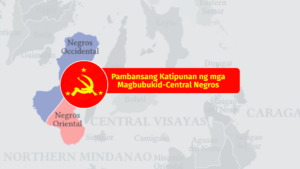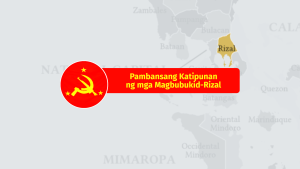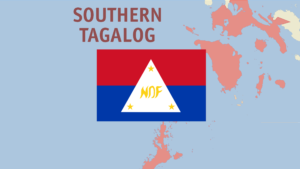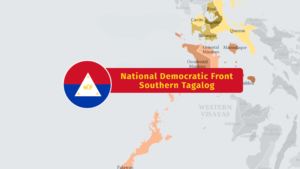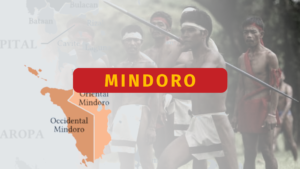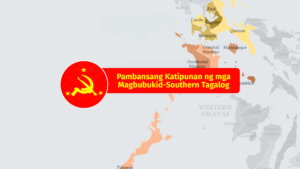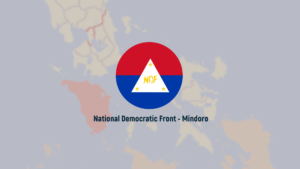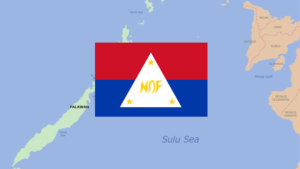A comment on the SONA of Marcos Junior
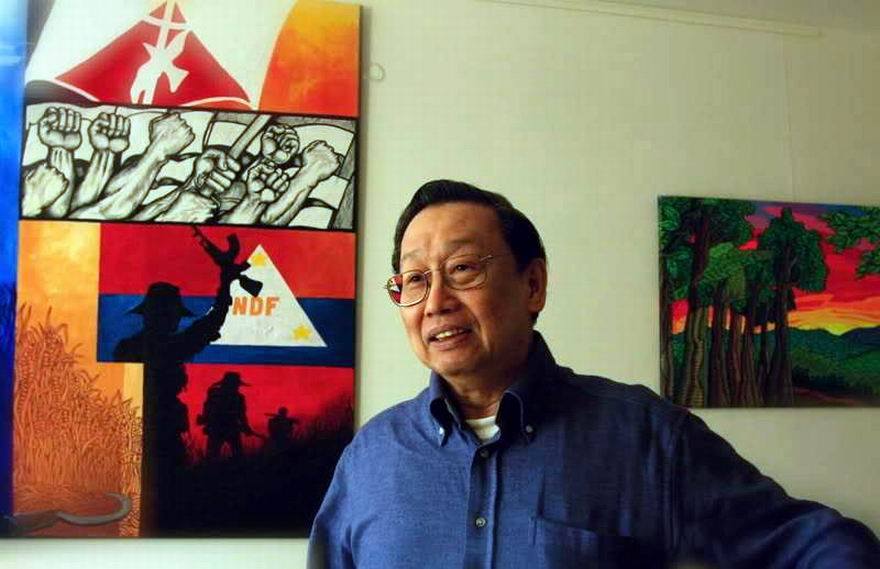
If a reader of the state of the nation address of Ferdinand Marcos, Jr. wants to know its content and save time, he or she only needs to read the concluding sentence of the speech: “I know this in my mind, I know it in my heart, I know it in my very soul … The state of the nation is sound!”
From the beginning of his speech, Marcos plays the role of con-man. He pretends briefly to acknowledge that there are “difficulties” or problems that afflict the nation and require solutions. But he does not identify the biggest of these problems, which involve the escalating conditions of oppression and exploitation of the broad masses of the people, especially the toiling masses of workers and peasants.
He deliberately fails to mention such glaring facts as the continuing campaign of state terrorism and gross human rights violations unleashed by the tyrant Duterte (in treasonous compliance with the diktat of US imperialism to terminate the GRP-NDFP peace negotiations and try to destroy the people’s democratic revolution) and the grave socioeconomic crisis manifested by soaring inflation, joblessness, landlessness, mass poverty and hunger, bureaucratic corruption and military overspending, huge budgetary and trade deficits and the mounting public debt.
Marcos overlooks the shambles left by Rodrigo Duterte and praises him profusely. He is preempted from taking his immediate predecessor and close political ally to account for his brutal and corrupt rule. He is most indebted to Duterte for the automated electoral cheating that has allowed him to usurp the authority of president. They continue to cling to each other at least for the time being. Marcos thanks Duterte for laying the rotten foundation of the Marcos II regime. He does not take Duterte to account for the mass murders he has ordered and for bankrupting the government and economy by more than doubling the public debt of Php 5.9 trillion to Php 12.5 trillion in only six years.
In his SONA, Marcos presumes and promises that governing the Philippines is merely a matter of sound fiscal management, collecting taxes from the people and spending for the bureaucracy and its departments according to priorities that ignore the need to change fundamentally the semicolonial and semifeudal character of society and the predominance of foreign monopoly capitalism, feudalism and bureaucrat capitalism. The need to realize full national independence, democracy, social justice, economic development through genuine land reform and national industrialization and a patriotic, scientific and mass culture is urgent more than ever before.
Despite the high importance that Marcos attaches to tax collection, he does not say whether he will pay for the tax obligation of his family estate amounting to Php 203 billion. He is being true to his bureaucrat capitalist character like his late father. There are indications that he is already in the process of nullifying his tax obligations. However, the only force on earth that he can openly acknowledge as worthy of tax privileges or tax exemptions is foreign monopoly capitalism which he is determined to attract.
He boasts of depending on foreign investments and attracting them with tax exemptions under the Corporate Recovery and Tax Incentives for Enterprises or the CREATE Law and with 100 per cent foreign ownership under the economic liberalization laws such as the Public Service Act and the Foreign Investments Act. He is happy that the foreign investors will enhance productivity outside of Manila in logging, mining, plantations, tourist spots and some digital services.
Marcos looks forward to an initial increase of tax revenue to around Php 11.7 billion in 2023 alone. We can be certain that the tax burden will fall mainly on the broad masses of consumers who cannot avoid the excise taxes already incorporated in the prices of basic commodities and services for which they pay every day.
We can also be sure that the Marcoses , the other high bureaucrat capitalists and their foreign monopoly and big comprador accomplices will continue to engage in tax evasion in the export of raw materials and semimanufactures and in the import of equipment and consumer manufactures. The digital gadgets to facilitate tariff processing at the Bureau of Customs can also be used for technical smuggling as in the automated electoral fraud which has made Marcos Junior and Sara Duterte the president and vice president, respectively.
Marcos makes a big allowance for bureaucratic corruption by authorizing huge deficit spending through disbursements for 2022 to 2023 above 20 percent of gross domestic product or Php 4.955 trillion and Php 5.086 trillion, respectively, to ensure continuous implementation of priority programs. Disbursements will further increase over the medium-term from Php 5.402 trillion or 20.7 percent of our GDP in 2024 to Php 7.712 trillion or 20.6 percent of GDP in 2028.
Such allowance is provided for in the name of “headline goals” which are mere promises that cannot be accomplished within the next six years, especially the reduction of poverty to 9 per cent, growth rate of 6.5 to 8 per cent and 3 per cent deficit to GDP ratio. We can anticipate that the Medium-Term Fiscal Strategy of Marcos will result in colossal corruption rather than the attainment of short-term macro-fiscal stability, economic recovery and medium-term fiscal sustainability.
As secretary of agriculture supposedly determined to solve the problem of food shortage and inflation, Marcos gives to the peasant masses and fishermen a torrent of promises to provide technical and financial assistance and roads to markets. He promises cheaper fertilizer, pesticides, seeds, feeds fuel subsidy and other material assistance. But he fails to mention the liberalized importation of rice and other food products, including fish that have been caught by the Chinese poachers from the West Philippine Sea. He does not mention when the consumers would be able to buy a kilo of rice at Php 20.
He refers fleetingly to the need for agrarian reform. This is of low priority to him because he has not yet endorsed any legislative bill for this. He merely promises the condonation of Land Bank loans to 654,000 land reform beneficiaries in the amount of Php 58 billion to cover 1.18 million hectares. He also promises that new land reform beneficiaries will get their land free but for the purpose he can specify only 52,000 hectares of government-owned land for distribution mainly to retirees of the Armed Forces of the Philippines and graduates of agricultural science. He is slimy and slippery within a few paragraphs.
Just to be able to draw applauses from members of Congress, who are predominantly beneficiaries of vote buying and automated cheating in the vote count, Marcos covers a wide range of topics in order to spout glittering but superficial generalities and make patently false promises in the form of general and opaque statements. In the process, he falls into brazen self-contradictions, usually involving excessive spending amidst the bankruptcy of the government and economy. He also endorses 19 legislative bills. Most of these contain provisions that favor bureaucratic waste and corruption. One bill serves state terrorism by reviving mandatory military training of students which will give the AFP a wide platform for red-tagging and fascist indoctrination.
He talks as if he has all the money and the leeway to build the infrastructure for tourism as well as the railways for carrying goods. He promises to sustain infrastructure development spending at 5% to 6% of GDP. He intends to expand the infrastructure projects with the participation of foreign and Filipino crony corporations in construction and the importation of construction equipment and materials, continue to encourage the participation of the private sector in the development of programs. The problems will certainly be low tax revenues and tighter international credit.
Marcos also promises all kinds of health and welfare services to the people only to say in the same speech that these must be balanced with the state of the economy which is dismal and will remain dismal for years. He is already reducing the number of family beneficiaries of the Pantawid Pamilyang Pilipino Program which was once touted by the anti-communist strategy planners as the way to win the masses and isolate the revolutionary movement from the impoverished communities from the time of Arroyo to Duterte.
Marcos does not only promise but orders the Department of Social Welfare and Development to expand its work in disaster relief by building more operation centers, warehouses and stockpiles of food and other relief goods for disaster victims. But all these are subject to the scarcity of public funds. He decries the destruction of the environment and the disastrous change of climate but seeks to attract more foreign investments in logging, plantations, mining and other extractive enterprises and condones open pit mining, deforestation, free flow of acids, river siltations, anti-people damming and other destructive activities.
Marcos pompously announces that there shall be no more lockdown against Covid-19 as he decries the deleterious effects of the lockdown to the economy. And he takes the occasion to promise the replication of the Heart Center, Lung Center and Kidney Center to lower levels of government, the building of local centers for disease prevention and control, the dispatch of urban-based doctors, nurses and other health personnel to more health centers and hospitals in the rural areas and the availability of cheap drugs and herbal medicine. These are mere promises subject to the scarcity of public funds as in previous regimes. Otherwise we might as well believe that the Marcoses have an unlimited supply of “Tallano gold”.
Marcos promises to open “face-to-face” classes soon, but makes no budget allotment to solve an admitted shortage of more than 500,000 classrooms for 20-student single-shift classes. He wants to focus on education in science, technology, engineering and mathematics (STEM) and prioritize education in English mainly to make Filipinos more employable abroad. He wants education in English prioritized, contrary to findings that learning is better in the native tongue. He makes no mention of national industrialization and creating jobs in a big way.
He wants the Department of Migrant Workers to speed up seeking jobs abroad and facilitate labor recruitment of Filipinos by foreigners. He is oblivious of the fact that the hiring of migrant workers is adversely affected by the rapidly worsening crisis of global capitalism. The neoliberal economists around him do not tell him that neoliberalism and its kind of imperialist globalization are unraveling as the main conflicting imperialist powers engage in protectionism and in sanctions and counter-sanctions and are prone to favor state terrorism or fascism and wars of aggression.
But with utmost pomposity, Marcos glosses over the underdeveloped pre-industrial character of the Philippine economy and declares his wish to make abrupt leap forward to the Fourth Industrial Revolution. He does not understand that to develop industrially the Philippines cannot skip genuine land reform and national industrialization. Internet connectivity cannot replace the prior development of electro-mechanical processes in the production of machine tools and basic metals and chemicals. Without these, it can only generate consumer-users of YouTube and Tiktok among the intelligentsia and the increasing unemployed masses.
Marcos proposes the National Broadband Plan which is reminiscent of Arroyo’s NBN-ZTE scheme which failed some 15 years ago. He does not explain how big business interests will benefit from the government contracts in the plan. As a traditional bureaucrat capitalist, he cannot help but give priority to infrastructure building which gives conspicuous credit to the president and a big leeway for corruption. But short-term projects which give short-term jobs for the big foreign and Filipino construction companies result in long-term loss of industrial development and loss of income for the people, burdensome debt payments and damage to the environment.
Marcos plays up alternative sources of energy, such as solar and wind, and concedes that these will be owned and operated by private enterprises. This time he does not play up the revival of the Bataan Nuclear Power Plant which is built on a major geological fault and near a volcanic mountain. He refers to the gas resources in the Malampaya Sound and the Recto Bank to state that a review ought to be made on service contracts and mining concessions, avoiding any reference to public interest but indicating that the Marcoses ought to have a major interest there like the Arroyos and Dutertes.
Sounding more patriotic than his predecessor Duterte, Marcos declares that he is for an “independent foreign policy” and that he won’t abandon “even one square inch,” of Philippine territory in clear reference to the West Philippine Sea. But he cravenly avoids denouncing the fact that China has encroached on the exclusive economic zone of the Philippines and has taken control over maritime features (shoals and reefs) to make artificial islands and use them as military bases in violation of the UN Convention on the Law of the Sea and the final judgment of the Permanent Arbitration Tribunal in 2016.
He does not demand the immediate withdrawal of China from the West Philippines Sea and require China to pay for rent and for the damages inflicted on the Filipino fishermen and on the fishing grounds and marine environment. He does not state the political and judicial actions to which the Philippines can resort rightfully. But obsequiously, he merely calls for diplomatic conversations with China to arrive at a bilateral consensus. Like a well-trained puppet of US imperialism, he is also, quiescent about the wide swathes of Philippine territory occupied by US military forces under the Visiting Forces Agreement and the Enhanced Defense Cooperation Agreement.
In his state of the nation address, Marcos does not declare any policy or action towards the solution of any of the basic problems of semicolonial and semifeudal Philippine society. In fact, the policies and actions announced are meant to preserve the ruling system and aggravate the problems. As in the time of the brutal and corrupt rule of Marcos Senior, there is no offer of peace negotiations by the Marcos II regime to the NDFP even if only to know and respond to the people’s demands for national and social liberation. Consequent to the state of the nation address of Marcos Junior, the broad masses of the people are justified to continue with ever greater resolve and militancy their new democratic revolution through protracted people’s war.

